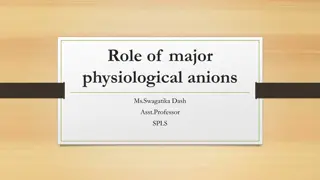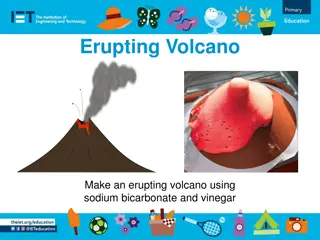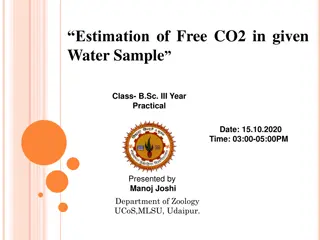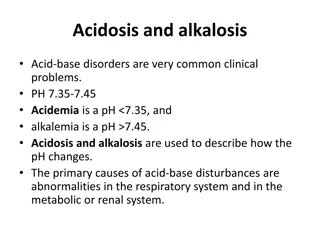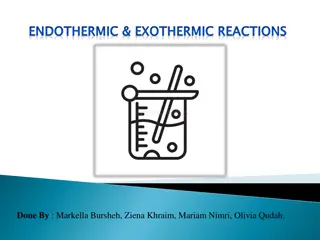Electrolyte and Metabolic Disturbances in the Critically Ill
Dr. Srilekha Ammapalli discusses the cations (sodium, potassium, calcium, magnesium) and anions (chloride, bicarbonate, phosphate, lactate) involved in electrolyte and metabolic disturbances in critically ill patients. The physiology, causes of abnormalities, diagnosis, evaluation, and management of
2 views • 104 slides
Pharmaceutical Technology Lab: Nasal and Ear Drops Formulations
Learn about the formulation and use of nasal and ear drops in pharmaceutical technology labs. Explore details on nasal drops for nasal passages, ephedrine nasal drop recipe, notes on ingredients, ear drops for ear care, sodium bicarbonate ear drop recipe, and procedures for preparation. Understand t
2 views • 13 slides
Comprehensive Overview of Pancreas Function and Structure
Pancreas is a vital organ in the abdomen with dual exocrine and endocrine functions. As an exocrine organ, it secretes digestive enzymes and bicarbonates into the duodenum for food breakdown. In its endocrine role, the pancreas regulates blood sugar levels by secreting insulin, glucagon, somatostati
1 views • 16 slides
Understanding Acids, Bases, and Neutrals in Natural Sciences Grade 7
Acids, bases, and neutrals are vital substances found in various settings like factories and laboratories. They exhibit distinct properties, with acids feeling rough, being corrosive, and containing hydrogen ions, while bases feel slippery, taste bitter, and contain hydroxide ions. While acids like
0 views • 15 slides
Role of Major Physiological Anions in the Human Body
Physiological anions such as chlorides, sulphates, bicarbonate, phosphates, and electrolytes play essential roles in maintaining various functions within the body. Chloride ions help in osmotic balance, charge balance, and acid-base balance. Sulphates are important for detoxification mechanisms and
0 views • 11 slides
Understanding Major Intra and Extracellular Electrolytes in Body Fluids
Body fluids contain various electrolytes crucial for maintaining cell and tissue environments. Electrolyte balance is essential for overall health, and external electrolyte replacement therapy may be necessary in certain conditions. The body's fluid compartments - intracellular, interstitial, and pl
0 views • 10 slides
DIY Erupting Volcano Experiment with Sodium Bicarbonate and Vinegar
Follow these easy steps to create a fun erupting volcano experiment using common household items like sodium bicarbonate and vinegar. Shape the volcano, mix lava ingredients, add vinegar, and watch the eruption happen before your eyes!
0 views • 6 slides
Estimation of Free CO2 in Water Sample for B.Sc. III Year Practical
The practical session focuses on estimating free CO2 in a water sample using titration methods with NaOH and Na2CO3. Students learn the process of converting carbonic acid to neutral sodium bicarbonate to determine the presence of free CO2. Procedures, reagents, observations, and calculations are de
0 views • 6 slides
Determination of Bicarbonate in Blood Using Back Titration
Back titration is an analytical chemistry technique used to determine the concentration of an analyte, such as bicarbonate in blood. This method involves reacting the analyte with an excess reagent, followed by back-titrating the remaining excess and relating it to the original sample's concentratio
0 views • 21 slides
Understanding Acidosis and Alkalosis in Acid-Base Disorders
Acid-base disorders, involving acidosis and alkalosis, are common in clinical practice. These conditions are characterized by changes in pH levels, with acidemia (pH < 7.35) and alkalemia (pH > 7.45) representing acidosis and alkalosis, respectively. The primary causes of these imbalances lie within
0 views • 17 slides
Understanding Groundwater Quality Assessment
Groundwater quality is vital for various purposes such as drinking, industrial, and irrigation water. Assessing the quality involves measuring physical, chemical, and biological constituents, including inorganic elements like bicarbonate, sulfate, chloride, and more. Major cations and anions play a
0 views • 22 slides
Understanding Endothermic and Exothermic Reactions Through Experiment
Explore the concepts of endothermic and exothermic reactions with a detailed experiment to determine which solute dissolves most endothermically and exothermically in water. Discover the roles of heat transfer in chemical reactions using potassium chloride, calcium chloride, sodium carbonate, and so
0 views • 11 slides




